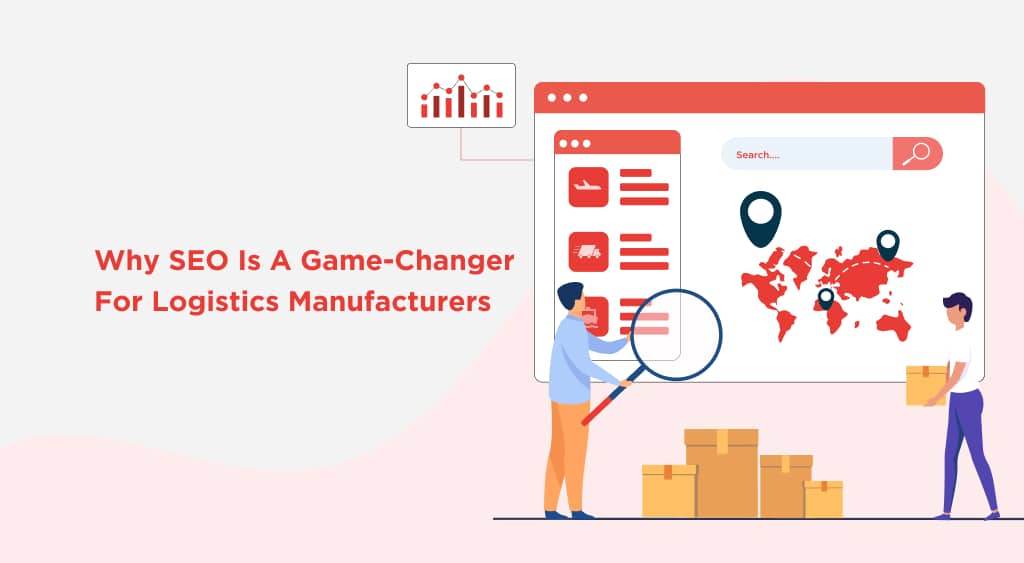Why SEO is a Game-Changer for Logistics Manufacturers
30 Dec 2024 | 6 min read
The Importance of SEO for Manufacturers
In today’s digital-first world, SEO for manufacturers is like having a well-placed billboard on the internet highway. It’s a critical tool for making your business visible in the vast online marketplace. Let’s delve into why mastering SEO is a game-changer for manufacturers.
The Role of SEO in Online Visibility
Imagine the internet as a massive global trade show. SEO helps your manufacturing business set up a visible, attractive booth in this virtual show. When people search for the products or services you offer, effective SEO ensures that your website appears in their search results. This online visibility is critical, as it’s often the first step in turning a searcher into a customer. In a world where online searches often precede purchasing decisions, being easily found can significantly impact your business’s growth and reach.
Why Manufacturers Need to Focus on SEO
For manufacturers, focusing on SEO is like tuning a radio to the right frequency to reach your desired audience. It’s crucial for several reasons. First, it increases brand awareness, helping you stand out in a crowded market. Secondly, it’s about reaching the right audience – those who are actively seeking the products you manufacture. SEO is also pivotal in building credibility and trust in your industry. It’s not just about driving traffic; it’s about drawing in the right traffic that can convert into tangible business opportunities.
Understanding Logistics SEO
Embarking on SEO for a logistics company is like plotting the most efficient route. It involves strategizing how to make your logistics services stand out online, ensuring those in need easily find them. Let’s dive into the essence of Logistics SEO and its critical components.
What is Logistics SEO?
Logistics SEO is fine-tuning your online presence to boost your visibility in search engine results. Picture it mapping the digital landscape to ensure your logistics services are prominently displayed. When potential customers search for logistics-related services, a strong SEO strategy ensures your website is one of their foremost destinations. This involves skillfully integrating industry-specific keywords, crafting relevant and engaging content, and providing your website is straightforward and informative.
Key Elements of Logistics SEO
Navigating the key elements of Logistics SEO is similar to assembling a complex logistics network. It starts with keyword research and targeting, where you identify the specific terms your potential clients use in their online searches. Next is on-page optimization, which ensures your website’s pages are optimally structured with these keywords, making the content engaging and accessible. This includes refining your headlines, text, and images to be appealing and functional. Lastly, technical SEO focuses on the behind-the-scenes aspects of your website, like loading speed, security, and mobile compatibility. All these elements work in unison to elevate your website’s ranking in search results, enhancing visibility and drawing in the right audience.
Benefits of Logistics SEO for Manufacturers
Implementing SEO for a logistics company is like setting up road signs that guide more traffic to your business. For manufacturers, this can bring many benefits, enhancing your online presence and business growth. Let’s explore these advantages.
Increased Online Visibility
Optimizing your logistics services for search engines is like turning on a bright beacon in the digital world. It makes your website more visible when potential clients search for logistics services online. Increased visibility means your company gets noticed more, which is crucial in the crowded digital marketplace. It’s about ensuring your business stands out when customers are looking for logistics solutions that you provide.
Targeted Traffic and Lead Generation
Effective Logistics SEO is like having a magnet that attracts the right kind of visitors to your website. You draw in an audience actively seeking logistics services by using specific keywords and creating relevant content. This targeted traffic will more likely convert into leads, as visitors are already interested in your offer. It’s about attracting not just more visitors but also exemplary visitors who are potential customers.
Competitive Advantage in the Market
In the competitive world of manufacturing and logistics, strong SEO can give you a significant edge. It’s like having a faster, more efficient delivery route in the real world. When your website ranks higher in search results, it not only increases your visibility but also positions your brand as a leader in the logistics field. This competitive advantage can be vital in securing new clients and building long-term business relationships.
Strategies for Implementing Logistics SEO
Embarking on an SEO strategy for a logistics company is like planning a well-organized and efficient delivery system. It involves several key steps to ensure your online presence is as streamlined and effective as your logistics services. Let’s go through some essential strategies.
Keyword Research and Optimization
Keyword research in SEO is like selecting suitable routes for transportation. You must identify the terms and phrases your potential customers use when searching for logistics services. This involves understanding their needs and how they express them in search queries. Once you’ve identified these keywords, integrate them naturally into your website’s content, headers, and meta descriptions. It’s about making your website more relevant and easily discoverable for those specific searches.
Optimizing Website Structure and Navigation
Optimizing your website’s structure and navigation is like ensuring that your warehouse is well-organized and easy to navigate. Your website should have a clear, logical layout that makes it easy for visitors to find the information they need. This includes having a user-friendly menu, clear categories for your services, and a simple path to contact information or quote requests. A well-structured website enhances user experience, a crucial factor in SEO rankings.
Creating High-Quality Content
Creating high-quality content for your logistics website is akin to offering a comprehensive and detailed service brochure. Your content should be informative, engaging, and tailored to your audience’s interests and needs. This can include blog posts about logistics tips, industry news, case studies, or detailed explanations of your services. High-quality content not only helps improve your SEO but also establishes your brand as a knowledgeable and trustworthy authority in the logistics field.
SEO Best Practices for Manufacturers
Tackling SEO for manufacturing is like fine-tuning a complex machine – it requires precision, understanding, and a focus on critical practices to ensure your online presence is as robust and efficient as your manufacturing process.
Mobile Optimization
Mobile optimization ensures your product can be used in any setting. Your website must function seamlessly on smartphones and tablets. This means having a design that adjusts to various screen sizes, quick loading times, and easily clickable links and buttons. In a world where much online browsing happens on mobile devices, making your website mobile-friendly isn’t just a bonus; it’s necessary.
Local SEO for Manufacturers
Local SEO for manufacturers is like putting up a billboard in your local area. It ensures that your business shows up when nearby customers search for your manufacturing services. To enhance your local SEO, include location-specific keywords in your website, claim and optimize your Google My Business listing, and focus on getting local backlinks. This is especially important if your business operates in a specific geographic area or has a physical presence.
Regular Monitoring and Analysis
Consistently monitoring and analyzing your SEO is like conducting regular inspections in a manufacturing plant. Use tools like Google Analytics and Google Search Console to keep track of how your website is performing in terms of search engine rankings and user behavior. This ongoing analysis allows you to identify areas for improvement, adapt to changes in search engine algorithms, and stay ahead of competitors. It’s about using data to continually refine and enhance your SEO strategy, ensuring it remains effective and aligned with your business goals.
